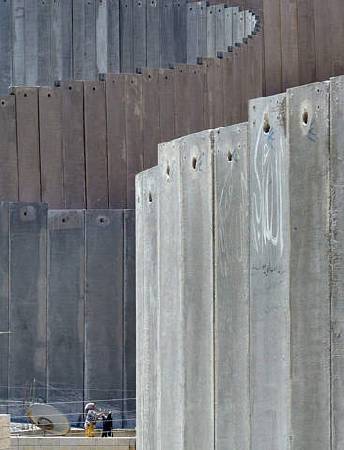

International Law, Israel, and Palestine
World Court Condemns Israel’s Wall
THE HAGUE, Netherlands (AP) – The U.N.’s highest judicial authority decided Israel’s planned 425-mile-long barrier in the West Bank violates international law and must be dismantled, according to court documents that were leaked ahead of the announcement.
As it began reading its decision, the International Court of Justice said Friday it has jurisdiction to rule on the legality of the barrier, which Israel is building in response to Palestinian suicide bombings that have killed hundreds of Israelis.
The Tel Aviv newspaper Haaretz, quoting court documents, reported that by a 14-1 vote the judges found the barrier, along its planned route, “gravely infringes” on the rights of Palestinians and cannot be justified by military needs or national security, and violates international law. The lone dissenter was U.S. judge Thomas Buerghenthal.
After being leaked to reporters, the document began appearing on Internet sites.
“Israel is under an obligation to terminate its breaches of international law; it is under an obligation to cease forthwith the works of construction of the wall being built in the Occupied Palestinian Territory, including in and around East Jerusalem, to dismantle forthwith the structure therein situated,” said the document, found on the Internet site http://electronicintifada.net. [Read the full text.]
The 15-member court’s advisory opinions are nonbinding but bear moral, historic and political weight. They can be the basis for U.N. action.
The advisory opinion was sought by the U.N. General Assembly in December at the Palestinians’ request. The court heard three days of testimony in February.
|
|
The court dismissed Israel’s objections that the General Assembly acted irregularly in asking for an advisory opinion.
It also rebuffed Israel’s argument – supported by the United States and several European countries – the court should refrain from interfering because the issue was political, not legal, and could disrupt Mideast peace efforts.
“A legal question also has political aspects,” said the ruling, which was being read by court president Shi Jiuyong of China. “The court accordingly has jurisdiction to give the advisory opinion” requested by the General Assembly.
The court said it was aware of the political negotiations over the internationally backed “road map” peace plan but said it was not clear its legal opinion would influence those efforts.
The court also dealt in passing with issues long in dispute between Israel and the Arab states.
It determined that the lands captured by Israel in the 1967 Middle East war are occupied territory, including East Jerusalem. Israel has refused to recognize Jerusalem as occupied since it was formally annexed by the Israeli parliament shortly after the war.
While the General Assembly and Security Council had never recognized Israel’s claims, it was the first time Israel’s status in the West Bank was the subject of an international legal judgment.
The Palestinians and Israelis were quick to react while the court’s decision was still being read.
Palestinian Prime Minister Ahmed Qureia welcomed the ruling.
“The international high court decided clearly today that this racist wall is illegal to the root and Israel should stop building it and take down what has already been built of this wall,” Qureia said.
Israeli officials, who sent no senior officials to The Hague in an attempt to keep the issue low key, defended the wall.
“The International Court in The Hague has no authority to deal with disputes between Israel and the Palestinians,” Israeli Foreign Ministry spokesman Jonathan Peled told reporters in Jerusalem.
The barrier is a complex of high concrete walls, razor-wire fences, trenches and watch towers. About one-fourth, or about 100 miles, has been completed, much of it close to the pre-1967 border although some of it dips into the West Bank.
If the court says it has jurisdiction, then rules the barrier illegal, the Palestinians will seek a General Assembly resolution demanding that Israel dismantle the wall, Nasser Al-Kidwa, the Palestinian U.N. observer, said earlier. If the Israelis refuse, the Palestinians will seek Security Council enforcement and risk a U.S. veto.
Israel says the barrier is needed to stop Palestinian suicide bombers, who have killed hundreds of Israelis since late 2000. Israel says infiltrations from the West Bank have dropped sharply since barrier construction began, and adds that there have been almost none from Gaza, which has been surrounded by a fence for years.
But Palestinians say the barrier imposes intolerable hardships on innocent people, separating them from schools, agricultural fields or workplaces. They also say the barrier is nothing but an Israeli land grab that will make it impossible to establish an independent state alongside Israel – a primary goal of the U.S.-backed “road map” peace plan.
Palestinians won some support last week from the Israeli Supreme Court, which ordered the government to reroute a 25-mile section of the barrier near Jerusalem.
The court said Israel must temper security with human rights and ruled that the disputed section “severely violated” the freedom of movement and “severely impaired” people’s livelihoods.
Prime Minister Ariel Sharon accepted that decision and told senior defense and military officials to review the fence’s route in problematic areas. Sharon previously denounced the world court hearings as “a campaign of hypocrisy.”
Several Israeli survivors and relatives of bombing victims gathered near the Peace Palace to press their argument that the barrier is essential for Israel’s security.
“People in Europe don’t understand what a terrorist attack means,” said Eliad Moreh, 28, who barely survived a bombing at a Hebrew University cafeteria two years ago that killed her friend sitting across the table.
| On the Net: | |
| Additional Resources |
Amnesty Report – Israeli army must respect human rights in its operations |
| Organizations |
B’Tselem: The Israeli Information Center for Human Rights in the Occupied Territories |
| International Humanitarian Groups Condemn the Barrier |
| Stay Informed |
|
Sign up for our mailing list and receive an email whenever we post a new article on our news site, Israel-Palestine News. |
If Americans Knew distributes and posts to our website copyrighted material, sometimes without the permission of the copyright owner. We are making such material available in our efforts to advance understanding of the Israel/Palestine conflict. We believe this constitutes a ‘fair use’ of any such copyrighted material as provided for in section 107 of the US Copyright Law since it is being distributed without profit for purely educational purposes. For more information go to: http://www.law.cornell.edu/uscode/17/107.shtml. If you wish to use copyrighted material from this site for purposes of your own that go beyond ‘fair use’, you must obtain permission from the copyright owner.
This website is printer-friendly. Please Print this article and share it with your friends and family.




